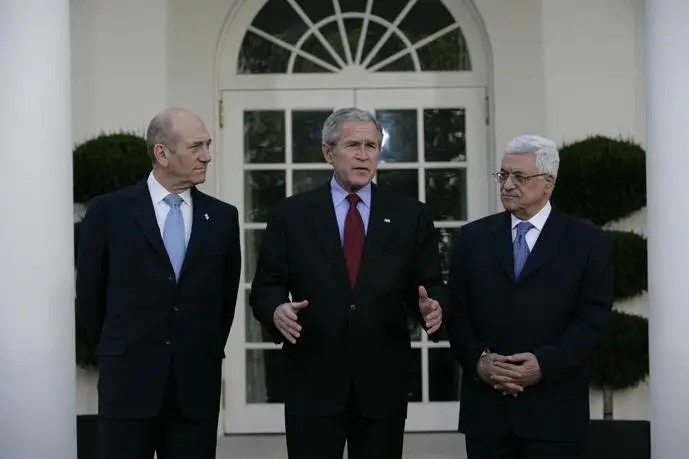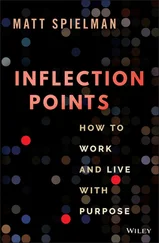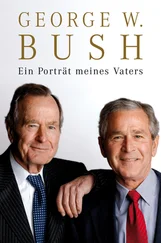President Abbas responded by expelling Hamas from his cabinet and consolidating his authority on the West Bank. “It’s basically a coup d’etat against democracy itself,” Abbas told me on the phone. “Syria and Iran are trying to set the Middle East ablaze.” We redirected our economic and security assistance to Abbas’s government in the West Bank and supported an Israeli naval blockade of Gaza. While we sent humanitarian aid to prevent starvation, the people of Gaza would see a vivid contrast between their living conditions under Hamas and those under the democratic leader, Abbas. Over time, I was confident they would demand change.
Condi and I talked about a way to restart momentum for a democratic Palestinian state. She suggested an international conference to lay the groundwork for negotiations between Abbas’s government and the Israelis. At first I was skeptical. The aftermath of a terrorist coup didn’t seem the most opportune time for a peace summit. But I came to like the idea. If wavering Palestinians could see that a state was a realistic possibility, they would have an incentive to reject violence and support reform.
We scheduled the conference for November 2007 at the U.S. Naval Academy in Annapolis, Maryland. Condi and I persuaded fifteen Arab nations to send delegations, including Saudi Arabia. Investing Arab partners in the process early would boost Palestinians’ confidence and make it harder for them to later reject a peace deal, as Arafat had at Camp David.
The key test of the conference was whether Abbas and Olmert could agree on a joint statement pledging to open negotiations. When we boarded the helicopter for the flight to Annapolis, I asked Condi for the statement. She said they had made a lot of progress but hadn’t finished. “You’re going to have to deliver this one yourself,” she said.
I pulled Abbas and Olmert aside individually. I told them the summit would be viewed as a failure and embolden the extremists if we couldn’t agree on a statement. They instructed their negotiators to work with Condi. A few minutes before we were due in front of the cameras, she brought me the document. There was no time to enlarge the font, so I pulled out my reading glasses and read from the page: “We agree to immediately launch good-faith bilateral negotiations in order to conclude a peace treaty … and shall make every effort to conclude an agreement before the end of 2008.”

With Ehud Olmert and Mahmoud Abbas. White House/Eric Draper
The room broke into applause. Abbas and Olmert delivered speeches of their own. “Freedom is the single word that stands for the future of the Palestinians,” President Abbas said. “I believe that there is no path other than peace. … I believe it is time. We are ready,” Prime Minister Olmert said.
It was a historic moment to see the foreign minister of Saudi Arabia listen respectfully to the prime minister of Israel and applaud his words. The Annapolis conference was hailed as a surprise success. “The cynicism about the Annapolis talks shouldn’t overshadow the hope that came out of the effort,” the Los Angeles Times wrote.
Shortly after Annapolis, the two sides opened negotiations on a peace agreement, with Ahmed Qurei representing the Palestinians and Foreign Minister Tzipi Livni representing the Israelis. Palestinian Prime Minister Salam Fayyad, an economist with a Ph.D. from the University of Texas, began carrying out long-needed reforms in the Palestinian economy and security forces. We sent financial assistance and deployed a high-ranking general to help train the Palestinian security forces. The day he left Downing Street, Tony Blair accepted a post as special envoy to help the Palestinians build the institutions of a democratic state. It wasn’t glamorous work, but it was necessary. “If I win the Nobel Peace Prize,” Tony joked, “you will know I have failed.”
The negotiations resolved some important issues, but it was clear that striking an agreement would require more involvement from the leaders. With my approval, Condi quietly oversaw a separate channel of talks directly between Abbas and Olmert. The dialogue culminated in a secret proposal from Olmert to Abbas. His offer would have returned the vast majority of the territory in the West Bank and Gaza to the Palestinians, accepted the construction of a tunnel connecting the two Palestinian territories, allowed a limited number of Palestinian refugees to return to Israel, established Jerusalem as a joint capital of both Israel and Palestine, and entrusted control of the holy sites to a panel of nonpolitical elders.
We devised a process to turn the private offer into a public agreement. Olmert would travel to Washington and deposit his proposal with me. Abbas would announce that the plan was in line with Palestinian interests. I would call the leaders together to finalize the deal.
The development represented a realistic hope for peace. But once again, an outside event intervened. Olmert had been under investigation for his financial dealings when he was mayor of Jerusalem. By late summer, his political opponents had enough ammunition to bring him down. He was forced to announce his resignation in September.
Abbas didn’t want to make an agreement with a prime minister on his way out of office. The talks broke off in the final weeks of my administration, after Israeli forces launched an offensive in Gaza in response to Hamas rocket attacks.
While I was disappointed that the Israelis and Palestinians could not finalize an agreement, I was pleased with the progress we had made. Eight years earlier, I had taken office during a raging intifada, with Yasser Arafat running the Palestinian Authority, Israeli leaders committed to a Greater Israel policy, and Arab nations complaining from the sidelines. By the time I left, the Palestinians had a president and prime minister who rejected terrorism. The Israelis had withdrawn from some settlements and supported a two-state solution. And Arab nations were playing an active role in the peace process.
The struggle in the Holy Land is no longer Palestinian versus Israeli, or Muslim versus Jew. It is between those who seek peace and extremists who promote terror. And there is consensus that democracy is the foundation on which to build a just and lasting peace. Realizing that vision will require courageous leadership from both sides and from the United States.

Jacques Chirac and I didn’t agree on much. The French president opposed removing Saddam Hussein. He called Yasser Arafat a “man of courage.” At one meeting, he told me, “Ukraine is part of Russia.”
So it came as quite a surprise when Jacques and I found an area of agreement at our meeting in Paris in early June 2004. Chirac brought up democracy in the Middle East, and I braced myself for another lecture. But he continued: “In this region, there are just two democracies. One is strong, Israel. The other is fragile, Lebanon.” I didn’t mention that he’d left out a new democracy, Iraq.
He described Lebanon’s suffering under the occupation of Syria, which had tens of thousands of troops in the country, siphoned money from the economy, and strangled attempts to expand democracy. He suggested that we work together to stop Syria from dominating Lebanon. I immediately agreed. We decided to look for an opportunity to introduce a UN resolution.
In August 2004, Lebanese President Emile Lahoud, a Syrian puppet, gave us our opening. He announced he would extend his term in office, a violation of the Lebanese constitution. Chirac and I cosponsored UN Resolution 1559, which protested Lahoud’s decision and demanded that Syria withdraw its forces. It passed on September 2, 2004.
Читать дальше













